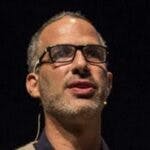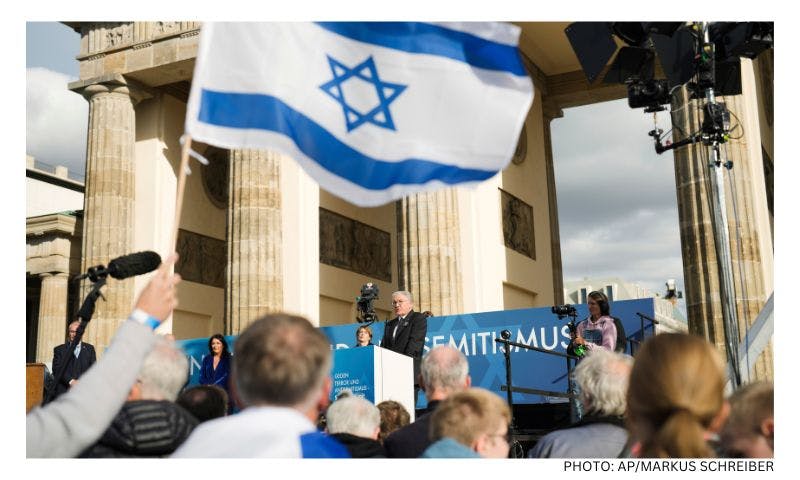Published: 3 August 2020
Last updated: 4 March 2024
IT WAS NOT EASY to get tickets for the exhibition about the German political philosopher Hannah Arendt exhibition in Berlin. Due to the Covid-19 pandemic the number of visitors allowed into the German Historical Museum was reduced; my wife and I had to book our tickets three weeks in advance.
Hannah Arendt and the Twentieth Century aims “to trace Arendt’s observations on contemporary history and introduce to the public a life and work that mirrors the history of the 20th century: totalitarianism, anti-Semitism, the situation of refugees, the Eichmann trial in Jerusalem, the political system and racial segregation in the US, the student movement and feminism.”
On entering, the visitor learns that Arendt was born in 1906 in the city of Linden, near Hanover, and died, an American citizen, in New York in 1975.
She studied philosophy, theology and classical philology at the universities of Marburg, Freiburg, and Heidelberg, under Martin Heidegger, Rudolf Bultmann and Karl Jaspers. Much has been written about her love affair with Heidegger, the philosopher who was close to the Nazis.
In one room, we see Arendt’s study of Rahel Varnhagen, the 19th century Jewish socialite who hosted one of Europe’s most prominent cultural salons. It included famous German writers such as Goethe and Schiller.
Varnhagen was seen as an example of successful Jewish emancipation. But according to Arendt, the complicated state of relations between Germans and Jews had its origins in the salon culture of the Romantic era. She took a sceptical view of the idea of assimilation in the name of universal equality. She considered this idea to be politically naïve. Arendt rejected the idea of Jewish assimilation not only to counter anti-Semitism, but as a trigger for anti-Semitism.
Is this the place where immigrants, refugees or expats trying to build a new life in Berlin finally find confirmation that the German demand for their assimilation is not going to work anyway? My mind turns to the immigrant football players like Sami Khadera, Jérôme Boateng or Lukas Podolski in the German national team. Where do they feel they stand?
Arendt was unmoved by the witnesses at Eichmann's trial. She found the overall effect to be as though the prosecutor were charging not Eichmann "but the whole world" with persecution of the Jews and criminal neglect.
In another room, we encounter the anti-Semitic writings of Joseph Goebbels, Nazi Germany’s minister of propaganda, and other Nazi thinkers. Included here is the 1938 order to strip Arendt of her German citizenship. (She was forced to leave Germany in 1933, and lived in Paris until 1941, when she escaped to Lisbon and then on the US, where she wrote and taught at the University of Chicago and the New School University in New York.)
We are told here that Arendt always spoke in a German accent when she was teaching. Judging by her theory of assimilation, she probably never intended to try and lose her German identity or accent in order to be accepted in the US. This resonated with me in terms of my Hebrew accent.
The accent of the immigrant has always been a problem for the other, in the US, Israel and elsewhere. If Arendt had immigrated to Israel, they would probably have laughed at her accent, too.
Then we come to the intellectual cornerstone of the exhibition: “Arendt significantly influenced two concepts that are essential for the understanding of the 20th century: ‘totalitarianism’ and ‘the banality of evil’,” and her famous dictum:
“No one has the right to obey.”
[gallery columns="1" size="large" ids="37237"]
To me this means nobody who works in a political system knows how much danger and damage they can create in the world. Today, when liberal democracy is losing ground all over the world, with populist leaders like Trump, Netanyahu, Bolsonaro, Orban, Johnson, Modi and others in power, this reflection becomes more and more urgent.
How can people within the system really understand the dangers of their leaders and oppose them when leaders have such a strong state behind them to subdue resistance? Can we, ordinary citizens, really exert the power to resist such control?
The lessons of the past 30 years suggest otherwise: Tiananmen Square, the failure of the Arab spring, the silence over the failed rebellions in Syria and Libya. What answer would Arendt have for these failed revolutions?
Arendt is best known for her reports for The New Yorker and subsequent book on the trial in Jerusalem of Adolf Eichmann, one of the main organisers of the Holocaust. The exhibition has a video from the trial in which Arendt can be seen in court wearing dark sunglasses.
She wears a summer hat, looks disguised and somehow doubtful. She was not going to the Eichmann trial to embrace the addresses full of pathos by Israeli prosecutors. "The trial is a real show trial," Arendt remarked in a letter to her husband after the first week of the camp survivors' testimony.
[gallery columns="1" size="large" ids="37236"]
She was unmoved by the witnesses, she wrote, but found the overall effect to be as though the prosecutor were charging not Eichmann "but the whole world" with persecution of the Jews and criminal neglect. "Eichmann is almost forgotten," she noted. Months later, at the sentencing hearing, the judges agreed with her: The testimony of survivors was historically and morally valuable but not relevant in judging Eichmann.
So of course, Arendt’s relation to Zionism changed over the years. First, she wrote positively about the national Jewish idea of the need to create a Jewish army that would fight with the Allies against Hitler. But after WW2, Arendt’s relationship to Zionism became more distanced.
When Menachem Begin, at the time head of the Irgun and Lehi militia, visited New York in December 1948 to raise money for the newly formed Herut movement, a group orf 26 intellectuals, including many Jews, wrote a letter of strong protest to The New York Times. Signatories to the letter included Arendt, Albert Einstein and Stefan Wolfe.
They warned against the Herut party and described it as dangerously radical and proto racist. Arendtwould turn in her grave to see Begin’s idea win over Israeli society through the Benjamin Netanyahu era.
Back then, she already raised the unavoidable question of what to do with the Arabs. Arendt was for a bi-national solution, the exhibition tells us. Here I would have loved to hear more.
“No one has the right to obey.” She meant not only the Nazi regime, or the bureaucracy of colonialism, with the implied consequences for displaced Arabs, but also the Soviet gulags.
I stopped in front of a huge photograph of Arendt, smiling and bending her head. Maybe her teachings spread too much? Did she know that the right-wing groups like the Alternative for Germany (AfD) and others around the world were going to use her analyses to resist liberal regimes that protect by order or law their multicultural character?
And the end of the exhibition, I feel mostly exhausted and not happy at all. Arendt’s writings and insights not only resonate with our contemporary life, they deepen my feelings of being a tennis ball hit back and forth across the court in a game that has been played for almost a century.




